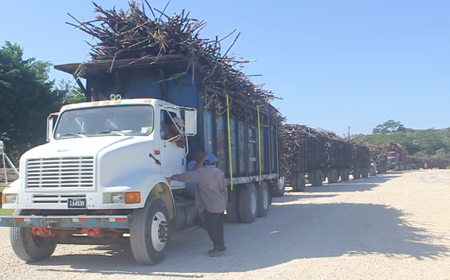ORANGE WALK, Mon. Jan. 26, 2015–After a long-drawn-out impasse that almost dealt a devastating blow to the local sugar industry recently, the quiescent mills at the Tower Hill sugar factory finally kicked into action shortly before midday today, signaling the long-awaited start of the 2014/2015 sugar cane harvest season, known to the caneros as “La Zafra”.
The starting date for the delayed season was finalized last Thursday, January 22, in Orange Walk Town during a consultation session with government affiliates and the principals of the three cane farmers associations – two of which are new: the Corozal Sugar Cane Producers Association (CSPA) and the Progressive Sugar Cane Producers Association (PSPA), both of which emerged during the recent splintering of the 55-year old Belize Sugar Cane Farmers Association (BSCFA), which still represents the majority of the cane farmers who do business with factory owners, Belize Sugar Industries (BSI), and its transnational parent company, American Sugar Refineries (ASR).
While all stakeholders were in high spirits – especially the cañeros who were eager to deliver their product, even if it means getting the short end of the deal – today’s event seemed almost inconceivable just a few weeks ago when uncertainty loomed as the BSCFA and BSI/ASR remained locked in a bitter dispute over a contentious commercial purchasing agreement, which was lately accepted by the BSCFA general membership, many of whom considered its terms inequitable and reluctantly approved the agreement “under duress”.
Nevertheless, BSCFA Orange Walk branch chairman, Alfredo Ortega, who had engaged in a campaign to have his association reject the compromise agreement that they agreed to sign last Sunday, January 18, maintained his displeasure with the contract, but mentioned that for now, they will work along with the millers for the betterment of the industry.
“It has been a very rough road up to this point because of what has transpired, but farmers are eager to deliver their cane because if they don’t deliver, they don’t make any money from what they have invested. Also, we want our farmers to deliver their cane because it is very important since many of us owe the banks and other financial institutions. We will continue our fight [because] we are not in agreement with what transpired, but the majority has said that they are willing to work, and we have to work with it [the agreement]. We remain firm in what our thoughts are in regards to the agreement, and we hope that one day that can be changed and things can be more beneficial for the farmers, but in the meantime, we will be working together with them so that all of us have the equal opportunity to deliver our material to the mill,” Ortega said.
Ortega expressed gratitude for the good weather which has so far prevailed and made it possible for them to deliver, but noted that inadequate sugar roads that some farmers must utilize to transport their cane to the mills are still in need of urgent attention.
Despite the tension between the BSCFA and the sugar producers, ASR’s Vice President of International Relations, Mac McLachlan, told the media that it is time to look to the future, and that their challenges can be worked out if all parties sit at the table and make collaborative decisions for the industry.
“I think we are in a position now where we can get on and do what we have to do. So far, things have moved in the right direction, and I don’t see any reason why that should change. Everybody wants to improve this industry and make it sustainable for the future – those who don’t want to do that, I don’t think there’s a place for them in that discussion”, he declared.
McLachlan added that the company welcomes the opportunity to work collectively with the three cane farmers associations for sustainability of all industry stakeholders, and looks forward to addressing the current “bottlenecks” in the industry, such as the prickly issue related to the payment for bagasse.
Chairman of the Sugar Industry Control Board (SICB), Gabriel Martinez, shared the same sentiments and acknowledged that the way forward will be challenging, but maintained that all cañeros will be included in future initiatives, starting with the strategic development plan which will be drafted over the next 12 months.
“I feel very happy that we have come to this day”, he said, adding that the most important thing is for all parties to have a cordial relationship in order to ensure a productive sugar cane crop.
Sugar Cane Production Committee (SCPC) chairman, Jose Novelo, explained that the associations will deliver on a 24-hour schedule according to the quantity of cane that they possess.
He affirmed that due to the impasse and other factors, there will be cane left in the fields, and that while the projected milling capacity for the factory is 1.35 million tons, they hope to grind at least 1.05 million tons over the course of the season with 6,000 tons being milled daily at first, after which the daily quota will gradually increase.
Of note is that the BSCFA owns roughly 66% of the estimated 1.477 million tons of cane that are in the field, 9% is owned by BSI, 18% by the PSPA, and the rest is owned by the other, newly formed groups of growers.


